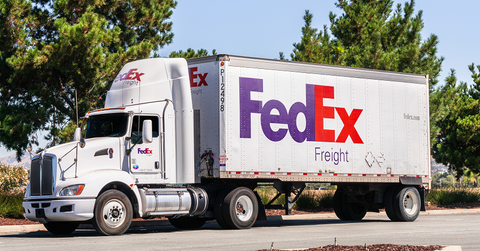FedEx Tax Bill: CEO Challenges New York Times’ Claims
FedEx (FDX) CEO Frederick Smith slammed the New York Times for its story about FDX’s tax bill. In a statement, Smith challenged the publisher to a debate.
Nov. 20 2020, Updated 3:57 p.m. ET

FedEx (FDX) CEO Frederick W. Smith lashed out at the New York Times for its November 17 front-page story about the delivery giant’s tax bill. In a statement released on November 18, Smith slammed the article and challenged the newspaper’s publisher to a public debate.
In the statement, Smith noted, “I hereby challenge A.G. Sulzberger, publisher of the New York Times and the business section editor to a public debate in Washington, DC with me and the FedEx corporate vice president of tax. The focus of the debate should be federal tax policy and the relative societal benefits of business investments and the enormous intended benefits to the United States economy, especially lower and middle class wage earners.”
In response to Smith’s comments, Danielle Rhoades Ha, VP of communications at the New York Times, said, “FedEx’s colorful response does not actually challenge a single fact in our story. We’re confident in the accuracy of our reporting.” She added, “FedEx’s invitation is clearly a stunt and an effort to distract from the findings of our story.”
The front-page story on FedEx’s tax bill
In its November 17 article, the New York Times sharply criticized Smith for lobbying for President Trump’s $1.5 trillion tax reform bill. The report stated that the FedEx CEO was proactive in campaigning for the tax reform bill in 2017. During his public appearances, he repeatedly emphasized that the money saved by the tax reform bill would be reinvested domestically.
However, the New York Times claimed, “But it did not increase investment in new equipment and other assets in the fiscal year that followed, as Mr. Smith said businesses like his would.” The article claimed that instead, the company realized enormous windfall gains.
The Times’ analysis stated that FedEx’s effective tax rate declined from 34% in 2017 to 0% in 2018. FedEx’s tax bill exceeded $1.5 billion in fiscal 2017. However, the company owed nothing in the next fiscal year. Despite zero tax liability, the shipping giant didn’t appear to increase its capital spending during fiscal 2018.
According to the New York Times’ article, FedEx has saved over $1.6 billion since the implementation of the tax reform bill. However, the logistics giant has made lower-than-expected capital investments in the past two fiscal years. Instead, it has spent more on rewarding its shareholders.
The New York Times noted that FedEx returned $1.6 billion in fiscal 2018 through share buybacks and dividends—more than double the amount it spent in fiscal 2017. The company returned $2 billion in fiscal 2019.
FedEx’s response
FedEx’s November 18 statement described the effects of the tax reform bill. The company’s statement noted, “FedEx has paid federal income tax every year, including fiscal year 2018. Following passage of the Tax Cuts and Jobs Act (TCJA), FedEx invested billions in capital items eligible for accelerated depreciation and made large contributions to our employee pension plans.”
FedEx noted that these factors resulted in a temporary reduction in its income tax burden. According to the company, it served the tax reform bill’s real purpose to boost GDP and increase domestic investments.
FedEx also noted that “the accelerated depreciation deductions are only temporary with higher depreciation and lower taxes early in the life of a new capital asset. This is then offset by lower depreciation and higher taxes later in that asset’s life.”
Notably, the new tax bill lowered the corporate tax rate to 21% from 35%. Moreover, companies are now allowed to deduct the full cost of new equipment in the same year in which they purchase them.
In its statement, FedEx noted that it had paid over $10 billion in total taxes to the US government in the last five fiscal years. Smith noted that the New York Times’ November 17 front-page story is “a distorted and factually incorrect story.”
Further, Smith raised questions over the newspaper’s income tax and capital spending history. He stated that the company “paid zero federal income tax in 2017 on earnings of $111 million, and only $30 million in 2018 – 18% of their pretax book income.” Criticizing the newspaper’s capital expenditure plans, Smith stated that the company reduced its capital spending by half to $57 million.
FedEx’s stock performance
FedEx has been one of the most battered stocks in the logistics industry over the 12 months. Back-to-back dismal quarterly performances and the US-China trade war uncertainties have made investors increasingly cautious about its near-term growth prospects.
FDX stock has lost 30.5%—nearly $18 billion—in market capitalization over the previous year. At its November 18 closing price of $157.55, FedEx stock was trading near its 52-week low of $137.78. Additionally, the stock is down 33% from its 52-week high of $234.49.
In the last 12 months, FedEx stock has underperformed the broader market as well as the iShares Transportation Average ETF (IYT). The Dow Jones, the S&P 500, and IYT are up 10.3%, 14.1%, and 2.5%, respectively.
Moreover, the company’s peers have made significant gains in their stock prices over the last year. United Parcel Service (UPS), XPO Logistics (XPO), and Old Dominion Freight Line’s (ODFL) stocks returned 11.5%, 10.2%, and 43.4%, respectively.
